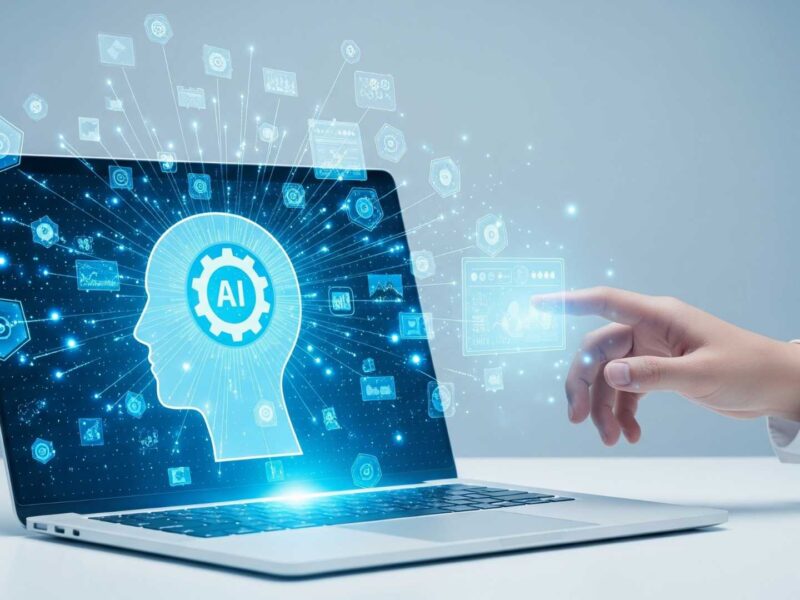The Conscience of the Machine: An Expert Guide to AI for Humanity
As AI becomes more accessible, its potential to address pressing societal needs grows, but strategic focus is key to maximizing impact.
This Techronicler article gathers insights from business leaders, thought leaders, and tech professionals on accelerating AI for social good.
From fostering inclusive partnerships to democratizing AI literacy and creating open-access platforms, these experts share actionable strategies to tackle challenges like bias, healthcare equity, and environmental issues.
Their approaches emphasize collaboration, ethical design, and community-driven solutions, offering a roadmap to harness AI’s transformative power for a better, more equitable future while ensuring alignment with real-world societal needs.
Read on!
AI Reduces Hiring Bias, Promotes Equity
Although there are many potentially negative outcomes of using artificial intelligence, AI could also be used for social good.
Recently, we worked with a company that used artificial intelligence to reduce bias in hiring by assessing applicants’ resumes, cover letters, social media profiles, and interview transcripts and evaluating them on factors such as aligned experiences, soft skills, cultural fit, and career and education background.
Unfortunately, all humans have biases – whether they are blatant or hidden. Biases based on our past experiences, our environment, and more. Sometimes, factors like race, gender, and sexuality can get in the way of hiring the best person for the job.
However, AI can minimize or even eliminate this bias and recommend candidates based on the factors that actually matter.
AI Accelerates Social Good with Partnerships
I believe one of the fastest ways to accelerate AI for social good is through intentional cross-sector partnerships—where tech innovators work directly with nonprofits, local governments, and frontline communities. When AI tools are built with the people most affected by societal issues, not just for them, we see real traction.
For example, during a recent visual documentation project, we collaborated with an environmental NGO tracking illegal dumping via drone imagery. The bottleneck wasn’t the data—it was the time it took to analyze it. By integrating open-source AI models for image classification, we cut their processing time by 70%, allowing them to take faster legal action and publicize violations with hard evidence. That transformation didn’t come from just tech, but from clear feedback loops and shared goals.
To truly scale this impact, we need funding models that reward open-access AI tools solving public problems, not just commercial ones. Embedding transparency and community-driven design into these projects ensures that AI evolves as a force multiplier for equity, not just efficiency.

Kaz Marzo
Operations Manager, Image Acquire
Open Data Fuels AI For Social Good
One meaningful way to accelerate the use of AI for social good is to invest in open-data collaborations between governments, nonprofits, and private tech firms, particularly around access to justice, healthcare equity, and climate resilience.
In many cases, the problem isn’t that we don’t have the tech; it’s that the right people don’t have access to the right data or the tools to interpret it effectively.
For example, if AI systems can be trained on anonymized, publicly funded legal outcomes or healthcare datasets, we could build predictive tools that help underserved populations navigate complex systems, like immigration, housing, or disability benefits, without needing expensive legal or professional support.
To do this responsibly, we need shared ethical frameworks and legal clarity around privacy, bias mitigation, and consent areas where my firm and others like it can play a role. But with the right guardrails, AI can absolutely become a force multiplier for impact where it’s needed most.

Kalim Khan
Founder, Affinity Law
Open-Access AI Fuels Social Good
One of the most effective ways to accelerate AI for social good is through the creation of open-access AI platforms and datasets that enable ethical innovation.
By democratizing access to high-quality data and open-source models, we empower startups, nonprofits, and researchers to solve real-world problems—from climate change to healthcare access.
Strategic partnerships between tech firms, governments, and civil society can ensure these tools are inclusive, responsibly governed, and focused on impact.
Furthermore, embedding community feedback loops during AI development ensures that solutions are not only data-driven but also deeply human-centric.
With collaborative ecosystems and ethical transparency, AI can rapidly scale to meet pressing societal challenges.
Muhammed Fawas
SEO Team Lead, D’Exito Branding
AI For Social Good: It's Not Complicated
At KINNECT, we use AI to solve one of the biggest problems people face today—disconnection and the loss of generational memories.
I believe using AI for social good isn’t complicated. Start with a real issue and build toward it. The challenge is that people trying to create real change often run up against systems more interested in money than meaning.
However, technology can help us communicate more effectively, show up for each other, and address emotional and social issues that truly matter.
It just takes the right partnerships, especially with people and organizations focused on aging, care, and end of life. That’s why I’m proud of what we’re doing at KINNECT.

Omar Alvarez
Founder & CEO, Kinnect
AI Literacy is the New Digital Literacy
The fastest catalyst is to treat AI literacy as the new digital literacy inside every mission-driven organization. Pair hands-on training with real tasks: the grant writer who masters prompt design drafts proposals in one-tenth the time; the community advocate who learns bias-check scripts steers policy with evidence, not anecdotes.
Embed these skills in 90-day “reflection sprints” where teams share wins, surface risks, and refine prompts together. The result is a self-reinforcing loop—higher-quality work, delivered faster, with equitable guardrails set by the very people serving the community. When every staffer wields a co-pilot, capacity stops being the constraint, and social impact scales at the speed of collective intelligence.

Chris Heuer
Managing Director, Team Flow Institute
Collaboration Accelerates AI for Social Good
Above all, the fastest way to accelerate AI for social good is through public-private collaboration focused on underserved communities.
For example, partnering tech companies with nonprofits and local leaders can ensure AI solutions solve real problems, from improving senior healthcare access to helping families understand insurance and financial literacy. In fact, AI can sift through massive data to predict community needs before crises hit.
But that only happens when ethical design, human oversight, and on-the-ground partnerships come together.
Furthermore, we must invest in education so everyday people, not just coders, can shape the future of AI. When technology empowers people instead of replacing them, we create long-term impact.

Daniel Ray
Founder, Pinnacle Quote
AI Can Help Fight Climate Change
Environmental Protection: AI systems can help us enhance strategies to reduce environmental and ecological damage, such as greenhouse gas emissions.
The World Environment Situation Room, for example, uses sensor data to provide real-time estimates of CO2 atmospheric concentration levels and sea level rise.
According to the Boston Consulting Group, AI’s varied capabilities can reduce carbon dioxide emissions by 2.6 to 5.3 gigatons. As upgrades and technical applications advance, we should expect better systematic answers to climate threats.

Jeff Romero
Founder, Octiv Digital
AI is a Bridge for Specialized Knowledge
My take: Focus on reducing AI’s technical barriers, not just funding big initiatives.
After building Deploforce—an AI tool that automates complex Salesforce development tasks—I’ve seen firsthand how AI’s biggest impact comes from making specialized knowledge accessible to everyday users.
Instead of requiring deep technical expertise, we’ve created workflows where non-developers can generate sophisticated code through simple conversations.
The real acceleration happens when we stop treating AI as a replacement for experts and start using it as a bridge. Small nonprofits shouldn’t need million-dollar budgets or PhD-level teams to automate their operations or analyze their impact data.
When AI tools are intuitive enough for a program coordinator to use, that’s when we unlock true scale for social good.
The path forward isn’t more complex AI—it’s simpler interfaces that let passionate people focus on solving problems instead of wrestling with technology.

Nahuel Moreno
Founder, Deploforce
On behalf of the Techronicler community of readers, we thank these leaders and experts for taking the time to share valuable insights that stem from years of experience and in-depth expertise in their respective niches.
If you wish to showcase your experience and expertise, participate in industry-leading discussions, and add visibility and impact to your personal brand and business, get in touch with the Techronicler team to feature in our fast-growing publication.












